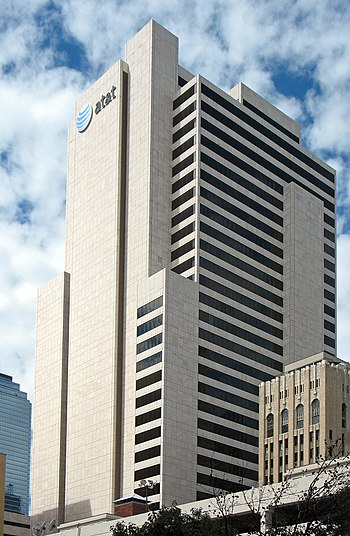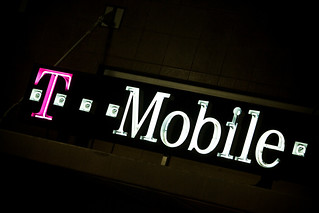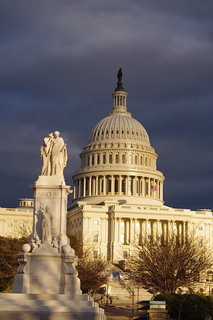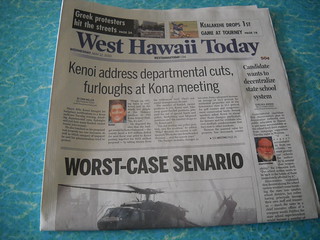By Carl Weiss
What is Net Neutrality and how could its loss rock the world as you know it? Way back in 1995, when the Internet was young, the rules were established that guaranteed nobody could have undue influence over the speed at which information was disseminated. What this meant for everyone online was that the big multinational conglomerates, which already had a stranglehold on the radio and TV airwaves wouldn't be allowed to monopolize cyberspace. So from 1995 to the present, the Internet had one speed limit for all. Online businesses, both big and small could prosper. However, recent events by a number of cable conglomerates are threatening the way in which we all surf the web -- and not for the better. If you value your ability to work and play online, read this article in its entirety and learn what -- if anything -- you can do about it. Ignorance will cost you the loss of net neutrality and increase the cost of accessing and using the Internet forever.
 |
| Courtesy of Flickr |
What is Net Neutrality and how could its loss rock the world as you know it? Way back in 1995, when the Internet was young, the rules were established that guaranteed nobody could have undue influence over the speed at which information was disseminated. What this meant for everyone online was that the big multinational conglomerates, which already had a stranglehold on the radio and TV airwaves wouldn't be allowed to monopolize cyberspace. So from 1995 to the present, the Internet had one speed limit for all. Online businesses, both big and small could prosper. However, recent events by a number of cable conglomerates are threatening the way in which we all surf the web -- and not for the better. If you value your ability to work and play online, read this article in its entirety and learn what -- if anything -- you can do about it. Ignorance will cost you the loss of net neutrality and increase the cost of accessing and using the Internet forever.
Worst than the Soup Nazi
We all remember the Soup Nazi on Seinfeld, the restaurant owner who would summarily refuse to serve a customer over even the smallest of perceived slights. Well, that’s what is in store for nearly everyone who connects to the Internet if some big players in the cable and telecom industries have their way. On HBO’s "Tonight with John Oliver" show, Oliver provided a great rant on what’s at stake. Watch right-on-the-mark rant in its entirety.
Must See YouTube Video from HBO
Net Neutrality Claims by AT&T Would Ruin the Internet
In a June 18th article by the "Washington Post," AT&T upped the ante by claiming that strong NetNeutrality rules such as those in Europe would actually hurt the Internet.
| English: One AT&T Plaza - AT&T headquarters in Dallas (Photo credit: Wikipedia) |
“AT&T is among the most vocal critics of reclassification. In a recent blog post, company exec Jim Cicconi argued that reclassifying Internet providers — placing them under Title II of the Communications Act instead of the more lenient Title I — wouldn't do anything to prevent the rise of Internet fast lanes, because embedded in Title II is a loophole that lets ISPs manipulate some traffic so long as it's not "unjust" or "unreasonable." If the ISPs can successfully claim that Internet fast lanes are necessary for, say, managing the load on their networks, they might be able to wriggle out of a ban on fast lanes altogether, defeating the whole point of reclassification, according to AT&T.”
AT&T is not the only company that proposes eliminating net neutrality. The "Washington Post" article goes onto explore the differences between Title I and Title II rules. But the most telling argument is actually contained in the video at the end of the article, which states: “If ISP’s like Verizon get their way, they’ll sell a fast lane on the information superhighway to companies willing to pay for it. That two-sided market could leave companies who don’t pay with slower speeds. And if things get ugly, ISP’s would be able to block their sites entirely.”
T-Mobile Gives Us a Glimpse
Clearly this would have the power to affect the success or failure of every business online. This pay-to-play scenario would hold every Internet user hostage to their ISPs. Think that can’t happen? Well it already has happened on a small scale for every T-Mobile user who streams music. Here's a recent quote from time.com:
| T Mobile (Photo credit: Thomas Hawk) |
“Instead of treating all music services equally, T-Mobile has decided that the most popular streaming music services should get better treatment. If you have a limited data plan on T-Mobile, you won’t come any closer to your monthly cap when using Spotify, Pandora, Rhapsody, iTunes Radio, iHeartRadio, Slacker Radio and Samsung Milk Music. This is the most insidious type of net neutrality violation, because it’s being pitched as a benefit. Most users stand to gain from the free data, so they may not even care about the slippery slope they’re on.” http://time.com/2901142/t-mobile-unlimited-music-net-neutrality/
While not technically a net neutrality violation, by playing favorites, T-Mobile is sliding down a very slippery slope, which, if backed by the power of law, could mean a very different Internet in the not so distant future. The problem is the law itself has lost much of its power to protect the consumer’s rights after an appellate court threw out the original version of the regulations back in January.
Congress Could Make it Worse
| US Congress (Photo credit: jessie owen) |
A June 20 article by pcworld.com stated: “Congressional Republicans are intent on derailing the FCC’s efforts to reinstate net neutrality rules. Conservative economists and telecom experts have been pushing antitrust law as an alternative to new rules on which the FCC is currently seeking public comment. Some Republican members of the U.S. House of Representatives Judiciary Committee said that the FCC should abandon its efforts to reinstate its net neutrality rules and instead rely on the Federal Trade Commission or the Department of Justice to police net neutrality.”
If that were to happen, then the only way that violations could be addressed would be via the country’s antitrust laws. This would open the floodgates to ISP-designed online toll-roads. If you think your cable bills are high now, if the current FCC rules concerning Net Neutrality fall by the wayside, you ain’t seen nothing yet. Not only would your access to the Internet be impinged upon by a few well-heeled companies, but fees for a number of services that you subscribe to online would also rise in order to offset their cost of doing business online. Gone would be the days of free online phone services like Skype. Streaming video services like Netflix would cost much more than it does now ... and even YouTube might be forced to charge to view videos on their service!
Most Major Cities Can’t Share Their Faster Fiber Connections
If you still don't believe the cable companies’ claim that they're the ones being wronged, check out this post on boinbboing.net:
Cable lobbyist-turned-FCC-Chairman, Tom Wheeler, can promise to override state laws prohibiting publicly owned ISPs, but it doesn't matter if all the big cities are locked into ten-year franchise agreements with cable and phone companies. As an electronic “Electronic Frontier Foundation" editorial points out,
| Logo of Comcast Latina: Insigne Comcast (Photo credit: Wikipedia) |
The Loss of Net Neutrality is a Worst Case Scenario
That’s right sports fans, not only are the cable companies trying to take away your access to low-cost, high-speed Internet access, but they're doing everything in their power to make sure cities across the country can’t provide municipally owned and operated fiber-optic access with superior speeds, to businesses and citizens alike.
| Spel Chek inyboddy? 139/365 (Photo credit: Jen R) |
So it seems that when it comes to giving the consumers a fair deal on Internet access, the cable conglomerates are trying to make the Soup Nazi seem like a Good Samaritan. If this prospect bothers you, then I strongly suggest you write your congressman and the FCC.
In this article, I've shown the real threat that changes to Net Neutrality laws would bring. I outline how the large cable and telecommunications giants are posturing to have Congress change the laws to favor their control and raise their profits at the consumer's expense. I show how the changes to the laws would prohibit many municipalities from sharing their ultra high-speed fiber infrastructure with their itizens.
If you found this article useful, share it with your friend’s family, co-workers and associates. Better
yet, write your congressional representatives and senators and tell them that you're against changing the Net Neutrality rules. Get involved, keep the Internet competitive, and out of the control of just a greedy few. For more details read the notes section of this blog for todays blog and BTR show. Thanks for reading, I hope you take action.
When he isn’t railing against online injustice, Carl Weiss is president of Working the Web to Win, an award-winning, all-digital marketing agency based in Jacksonville, Florida. You can listen to Carl live every Tuesday at 4 p.m. Eastern on BlogTalkRadio.
 |
| Get your FREE Copy above. |
If you'd like a FREE Copy of our eBook,
"Internet Marketing Tips for the 21st Century," please fill in the
form in the upper right-hand sidebar, where you will receive instant access to
our eBook. Your information is always kept private and is never sold.
When he isn’t railing against online injustice, Carl Weiss is president of Working the Web to Win, an award-winning, all-digital marketing agency based in Jacksonville, Florida. You can listen to Carl live every Tuesday at 4 p.m. Eastern on BlogTalkRadio.
Related articles






No comments:
Post a Comment